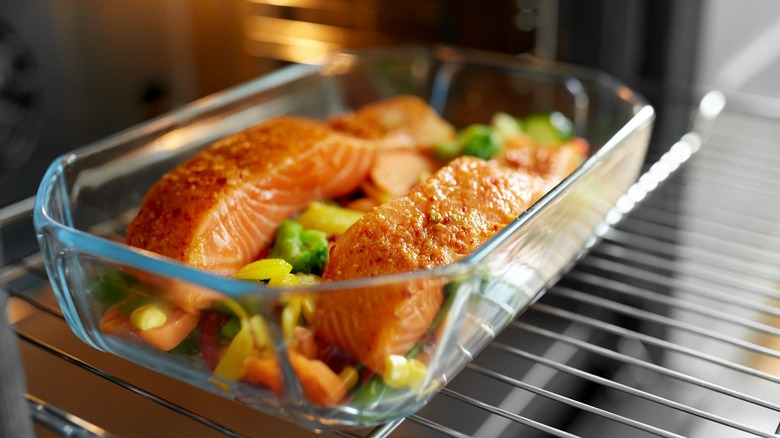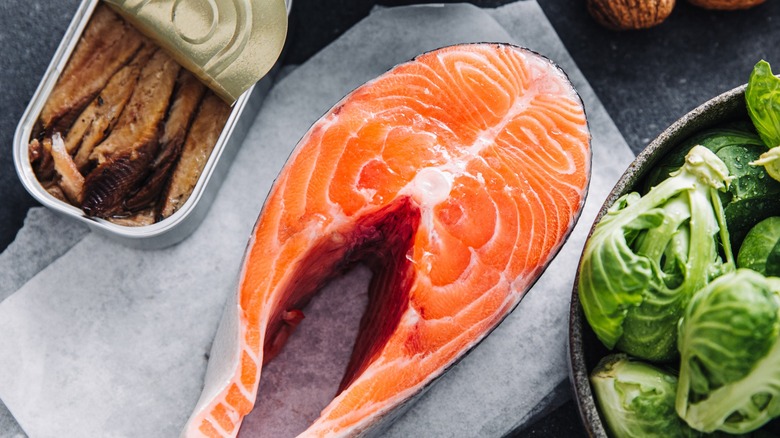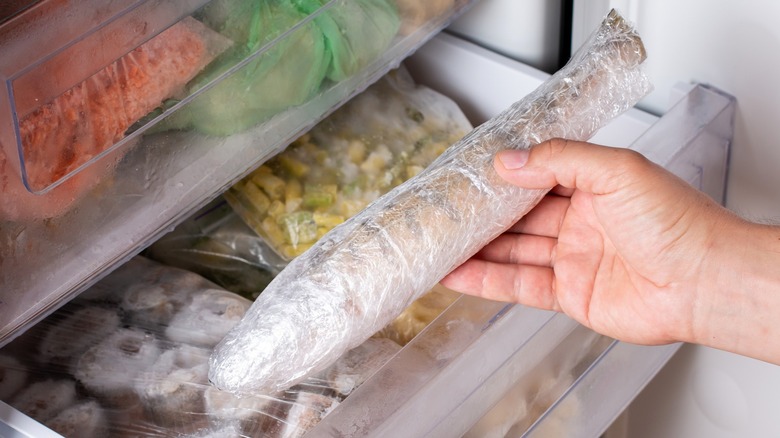The Best Type Of Fish To Cook Straight Out Of The Freezer
Cooking fish straight out of the freezer can be a game-changer for busy home cooks. It not only saves time but also locks in the freshness of the fish, ensuring a flavorful and healthy meal on your table. Not surprisingly, it's also a more sustainable way to enjoy fish, as it eliminates the water used to thaw frozen fish and avoids contributing to the mass discard of fresh fish that isn't sold in just a matter of days. And since NYC's health department mandated the freezing of fish, seeking out fish that's only been frozen the first time (rather than thawed for presentation at the market) is the best way to ensure a delicious cooked-from-frozen meal at home in locations with similar laws.
Fattier fish, such as salmon, mackerel, and sardines, possess higher oil content, which not only keeps them moist during cooking but also enhances their taste profile. One significant advantage of cooking frozen fattier fish is the reduced risk of overcooking. When fish is thawed before cooking, there is a higher chance of unintentionally overcooking it, leading to a loss of tenderness. However, with frozen fatty fish, the cooking time is more forgiving, as the oils act as a protective barrier, preserving the moisture within the fish.
The best fish to cook from frozen
When it comes to frozen fish, the higher the fat content, the better. Salmon is a popular fatty fish known for its rich, buttery texture and distinctive flavor. When cooked straight from the freezer, its high-fat content prevents it from drying out, making it an excellent choice for a quick and satisfying meal. Whether you grill, bake, or pan-sear it, frozen salmon tends to turn out moist and delicious.
Mackerel is another fatty fish that excels when cooked from frozen. By cooking it under a broiler or on a grill, you can achieve a delectable crispy skin while keeping the flesh tender and juicy. Similarly, swordfish is high in Omega-3 fatty acids, is firm, and grills very well. Next, trout is an easily accessible fatty fish that can be found frozen. In addition to Omega-3s, according to the British Trout Association, trout is packed with vitamin A, an antioxidant that does a whole lot of good for the body. Plus, it's got vitamin D — perfect to combat Seasonal Affective Disorder — and iodine, which helps the thyroid produce necessary hormones to keep our bodies functioning the way they should (per the NHS).
Lastly: sardines and anchovies. These small, oily fish are often overlooked, but they are hidden gems when it comes to cooking from frozen. Sardines are not only budget-friendly but also incredibly nutritious. Roast them with some herbs and olive oil for a quick and wholesome meal. Don't forget the bread!
How to cook frozen fish
There are plenty of ways to cook fatty fish like salmon, from pouring boiling water over it to salmon tartine. While cooking fatty fish from frozen is convenient, it's a totally different animal, so to speak — but a few essential tips can ensure the best results. You can simply take the fish out of the freezer and proceed directly to seasoning before hitting the oven, grill, or pan. But, you do need to adjust your cooking time and temperature slightly when working with frozen fish. Lower the heat and increase the cooking time to allow the fish to cook evenly without burning the exterior. Fatty fish can become oily if overcooked, so keep a close eye on the cooking process. Use a food thermometer to check the internal temperature and remove the fish from the heat once it reaches the appropriate doneness — 145 degrees, to be exact (via the FDA).
Of course, if you have the time, the FDA suggests letting the fish thaw out in the fridge the night before you need it. This keeps the flesh stored at appropriate temperatures to prevent deterioration and food-borne illness, and it also makes cooking a breeze. However, if you need to cook frozen fish fast, low and slow is the way to go.



